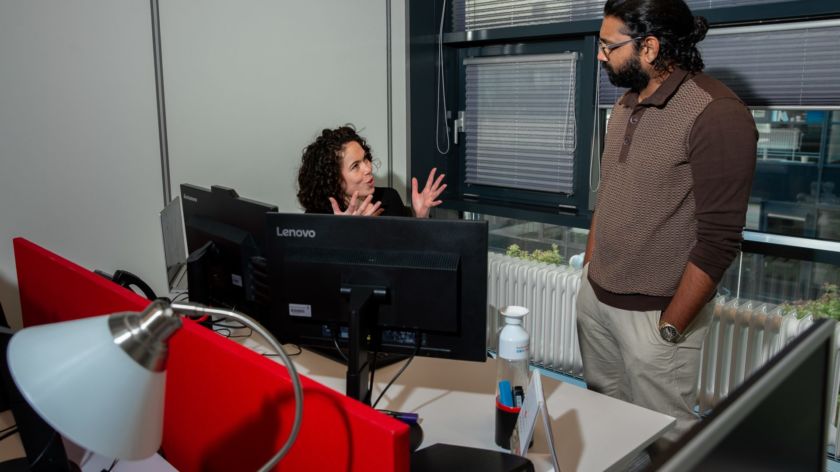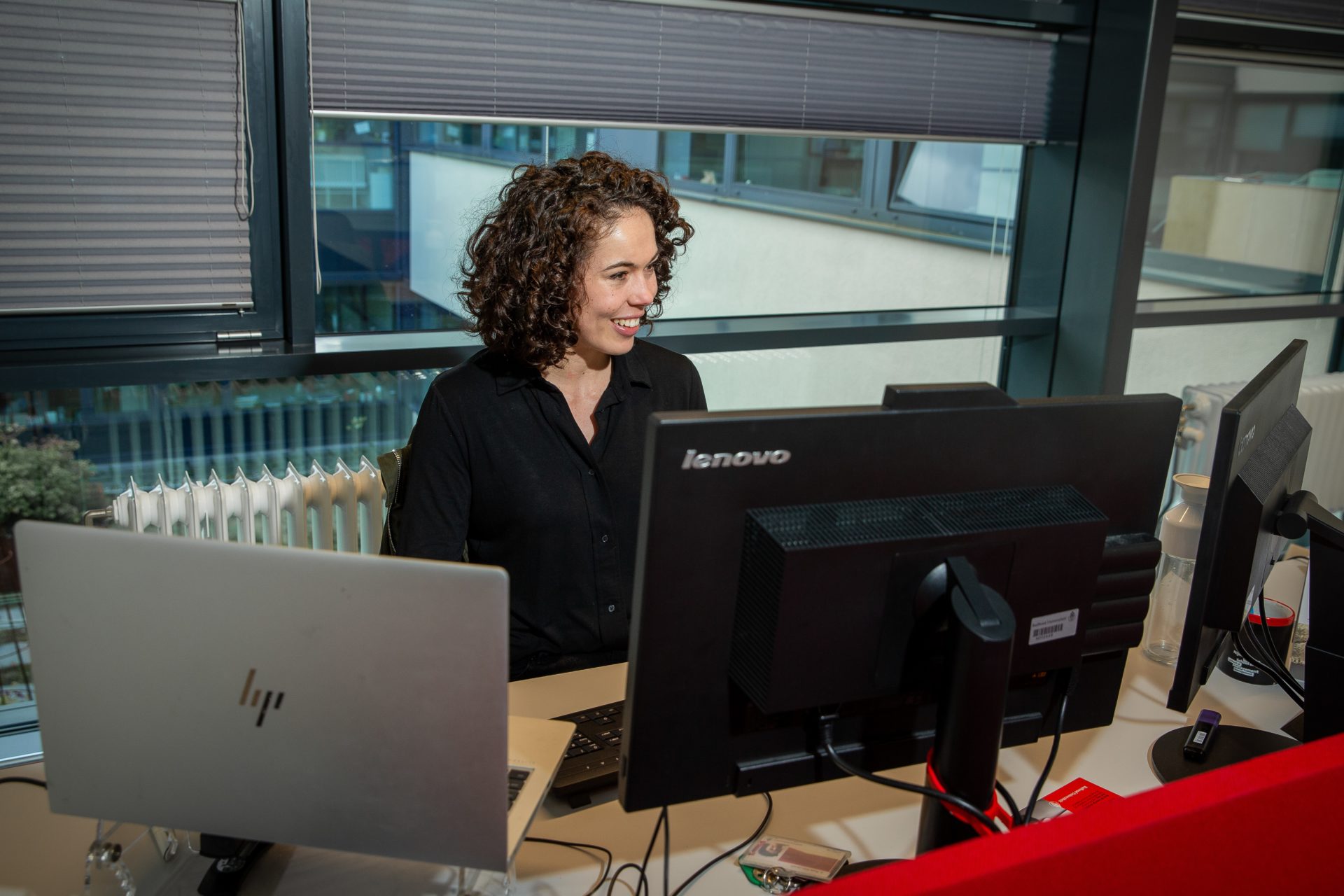PhD candidates bear the brunt of flexible working policy: ‘Eight people in one room’
-
 Promovenda Anell Roos in overleg met een collega. Foto: David van Haren
Promovenda Anell Roos in overleg met een collega. Foto: David van Haren
While Nijmegen School of Management was given extra offices this year, many PhD candidates actually have less space now. A lot of faculties are struggling with the same problem: PhD candidates often come off worst when it comes to allocating office space. ‘When I arrive at the office in the morning, sometimes it’s so busy that I just turn around and go home again.’
Anell Roos was happy with her office in the Elinor Ostrom building, where she worked with three fellow PhD candidates. Until Roos, who is studying for a PhD in business administration, suddenly had to move last summer. New offices were being built due to the increasing number of staff, but they were given less space. Roos now shares a workspace of the same size with five other PhD candidates from different departments.
This hinders her work, she says. ‘If there are fewer people in the office, you can occasionally arrange that someone takes a break when the other has an online meeting, but this is difficult if there are six of you. As a result, I constantly have to drag my things from home to the office, which means I’m less productive.’
Eight people in one room
A number of faculties are experiencing the same problem. At the Faculty of Science PhD candidates sometimes find themselves sitting with seven or eight people in one room. This is according to Inge Bleijenbergh, associate professor and member of the Works Council (OR) for the Aob trade union. ‘The university is a hierarchical organisation. The lack of space is passed on to the groups in the organisation that have the least status or are in the lowest job grades.’
As a Works Council member, Bleijenbergh asked questions about the workplaces during the last Joint Assembly, a meeting of the University Student Council, the Works Council and the Executive Board. During this meeting ideas were exchanged about Radboud University’s new working from home policy.
‘Working from home is often more difficult for young researchers’
The direct reason for the agenda item was the COVID-19 crisis, but the university wants people to be able to choose whether they work from home or in the office in the future too. This would be better for the environment and work-life balance, for example. ‘This sounds very convincing on paper’, says Bleijenbergh. ‘But this choice isn’t quite so free for everyone as this proposal makes it seem. Working from home is often more difficult for young researchers. And it’s exactly this group of people who have no quiet space in the office.’
Not informed
Although the working from home policy is still under discussion, there is already a lot of movement in the Elinor Ostrom building. Roos had to move out but only heard at the last minute that she had been given another place. ‘In July we were informed as PhD candidates that we had to pack up our things at the start of August’, she says. And then when she tried to get into her new office, Roos was met with a locked door. ‘There weren’t any keys available yet. I had to ask the doorman to open my office every morning.’ In her opinion, this poor communication is indicative. ‘As PhD candidates we weren’t informed about the move, let alone asked for our opinion.’
Roos contacted the chair of the PhD Council of her faculty, Charan van Krevel, himself a PhD candidate at the Department of Economics. Roos’s experience is not an isolated incident, says Van Krevel. ‘I have a colleague who discovered after the summer that his workplace had been moved. It took him three days to organise all his equipment so that he could start working again.’
But it’s difficult for the PhD Council to intervene, says Van Krevel. Because PhD candidates are frequently not consulted, members of the Council often only hear about it after the move has taken place. As an associate professor, Inge Bleijenbergh was informed about the new office layout. But PhD candidates like Roos weren’t notified. ‘It’s as if they don’t count as staff. While this group makes a significant contribution to scientific production’, says Bleijenbergh.
Each professor their own room
Roos had another unpleasant surprise awaiting her. One morning, when she found someone else’s things on her desk, she was told that her office was being used as a flexible working space. ‘I didn’t know anything about this either. In the end it turned out to be miscommunication, no one should have been given access to our office. But we are seen as a group that can easily be moved around.’
But other offices of PhD candidates are being used as flexible working spaces, according to Works Council member Inge Bleijenbergh. ‘There’s a shortage of space. The Department of Property Management is carefully thinking about this. They want to solve this problem by encouraging working from home and shared workplaces. This is possible, but then you have to let go of the idea that every professor should have their own room. At the moment it’s the young researchers who are bearing the brunt of this.’
Small living spaces
Representative Van Krevel agrees with the importance of good workplaces for PhD candidates. ‘These are people with temporary contracts and lower salaries, who are less well organised in participatory bodies. In addition, they often live in smaller accommodation than associate or assistant professors. I know someone who has to work with ten other people in a shared space. Just try to carry out proper research with a poor Wi-Fi connection.’
Van Krevel himself works mainly from home. ‘It’s difficult to focus properly on my work when there are other people talking around me.’ But there’s nothing wrong with the latter, he emphasises, as this should be possible in a workplace.
‘It’s a self-perpetuating problem’
When they raise the issue, the PhD candidates are often told that there are plenty of empty spaces. But that’s just the problem, says Roos. ‘It’s precisely because of the overcrowded offices that we don’t come into the office. And why the university, in turn, thinks: but they aren’t in the office every day, so they can share their room with more people. It’s a self-perpetuating problem.’
Lack of concentration
During lockdown Roos became overworked because she was working from home. ‘When I sat on the sofa in the evening, I could see the piles of papers heaped up on my desk. My work was always there, so I started working extra hours. I asked for permission to come into the office two days a week. That helped enormously.’
She now works more often at the university. ‘But sometimes it’s so busy in the morning that I just go home again’, she says. Roos does understand that PhD candidates are put together in a room so that they can share experiences and ideas with one another. ‘Social interaction is very important, but you can have this kind of interaction with two or three people in an office. Now it’s to the detriment of our research. And that’s what we’re here for at the end of the day.’





soundos schreef op 4 november 2021 om 17:10
Thank you so much for sharing your knowledge.